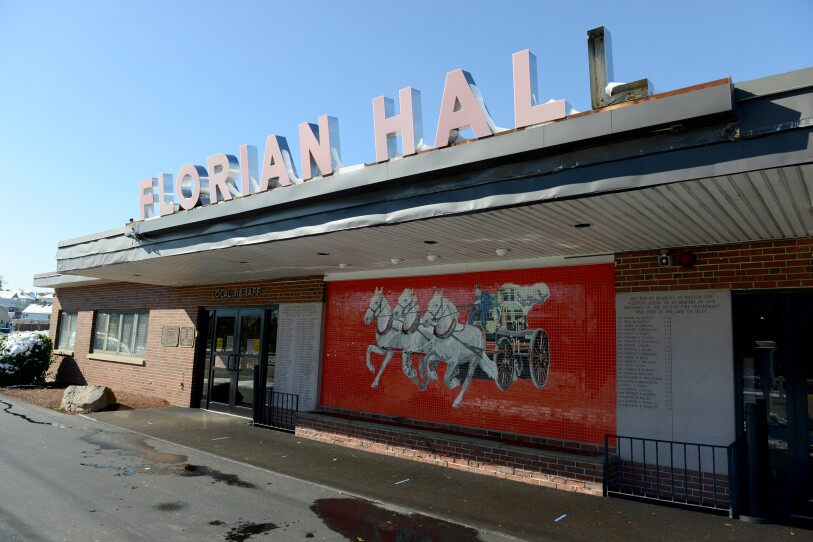It’s unlikely Donald Trump will win Massachusetts this week, and even more unlikely likely he’ll win Boston, where Hillary Clinton got 81 percent of the vote in 2016. But in one small pocket of the city, the odds of a Trump victory are actually pretty good.
Maureen Feeney, the former Boston City Councilor and current city clerk, has lived in the area in question — Ward 16, Precinct 12 — for half a century. (On a map of Boston, it’s the city’s southeastern tip, right across the Neponset River from Quincy and Milton.) It is, Feeney says, a place where voting is a social event.
“You’d have cake sales from St. Brendan’s grammar school, people talking and holding signs, giving jabs here and there,” Feeney said. “It’s just always been a critically important component of living in this neighborhood."
In addition, Feeney says, 16-12 can feel like a world unto itself, where the same families living side by side for generations creates what feels like a small town in the midst of the city.
“So many of the people who’ve lived here have married or whatever and have bought their parents’ house, or a neighbor’s house,” Feeney said. “I see Brian and Stevie and Amanda and they’re all bringing their kids — but they used to walk by my house when they were going to school.”
If you’re an outsider and visit 16-12, you’ll probably notice Florian Hall, the headquarters for the Boston Firefighters Union. The streets are full of single- and two-family homes with well-kept yards decked out for Halloween — not to mention a lot of American flags.

You might not see a single 'Donald Trump for President' sign. But that absence is deceptive.
“[Trump] didn’t win a single precinct in Boston, but he came damn close in 16-12,” said Yawu Miller, the senior editor of the Bay State Banner. “He got 46 percent of the vote.”
Every election cycle, Miller studies Boston’s election returns, looking for unusual results. And every election, 16-12 stands out. In 2017, for example, Mayor Marty Walsh crushed challenger Tito Jackson, winning a whopping 95 percent of the vote. And in 2018, when Rachael Rollins won the Democratic primary in the Suffolk County District Attorney’s race, her push for criminal justice reform drew support citywide — but not here.
“She received 20 votes,” Miller said. “And Greg Henning. the candidate who was backed by the police unions, received 360 votes.”
Larry DiCara, the former Boston City Councilor and mayoral candidate, says that outcome — and Trump’s strong performance two years earlier — may reflect the fact that 16-12 is packed with residents who work in public safety.

“It’s a neighborhood with a high percentage of people who are police and fire, and police have strongly supported Donald Trump,” DiCara said. “Certainly in the great debate about reforming the police department, and issues of liability, Donald Trump stands with the police, notwithstanding that generally, he’s anathema to organized labor.”
Many firefighters are standing with the police during that debate, too — including their statewide union, the Professional Fire Fighters of Massachusetts, whose website laments “unrelenting attacks” on “our Brothers and Sisters in blue.”
But DiCara said he believes the roots of 16-12’s unusual political identity go back further. He points to 1983, when Ronald Reagan stopped by the Eire Pub — a literal stone’s throw from the precinct’s northwestern corner — for a beer and some potent cultural symbolism.
“Ronald Reagan was able to relate to white, middle-class people far better than any Republican had up to that time,” DiCara said. “The Eire Pub visit was a real message that ‘I’m one of you folks, I’m one of the guys! I’ll have a cold one at the Eire!’”
Back then, DiCara says, you could find precincts like 16-12 throughout the city.
“These are churchgoing people,” DiCara said. “The majority of them are white. The great majority of them are Irish. [They’re] very set in their ways, and that includes politics.”
More Politics
Now, as affluent newcomers gentrify Boston, 16-12 has ceased to be representative. Instead, it’s an outlier.
Still, one big question remains: How could so many voters back Trump one year and Walsh, a vocal Trump critic, the very next?
DiCara notes that when Walsh was a state represenative, 16-12 was part of his district.
“He knows almost everyone in that precinct by first name,” DiCara said of Walsh. “He knows when Johnny’s going to graduate from B.C. High, or Mary’s going to graduate from UMass Boston, or whatever the case might be.”
But Miller has a different explanation.
“People used to say people would vote primarily on ethnicity in Boston, next on neighborhood — they’d vote for somebody from the neighborhood regardless of their ethnicity — and ideology was like the last thing,” Miller said. “So it was always more tribal.”
“I think it’s beginning to flip … almost everywhere, except that little section," he said.
On Tuesday, as Boston’s presidential results trickle in with what’s likely to be a minimal amount of drama, that little section might just be a national bellwether, telling us if Trump’s white, working-class support is as strong as it was four years ago.









